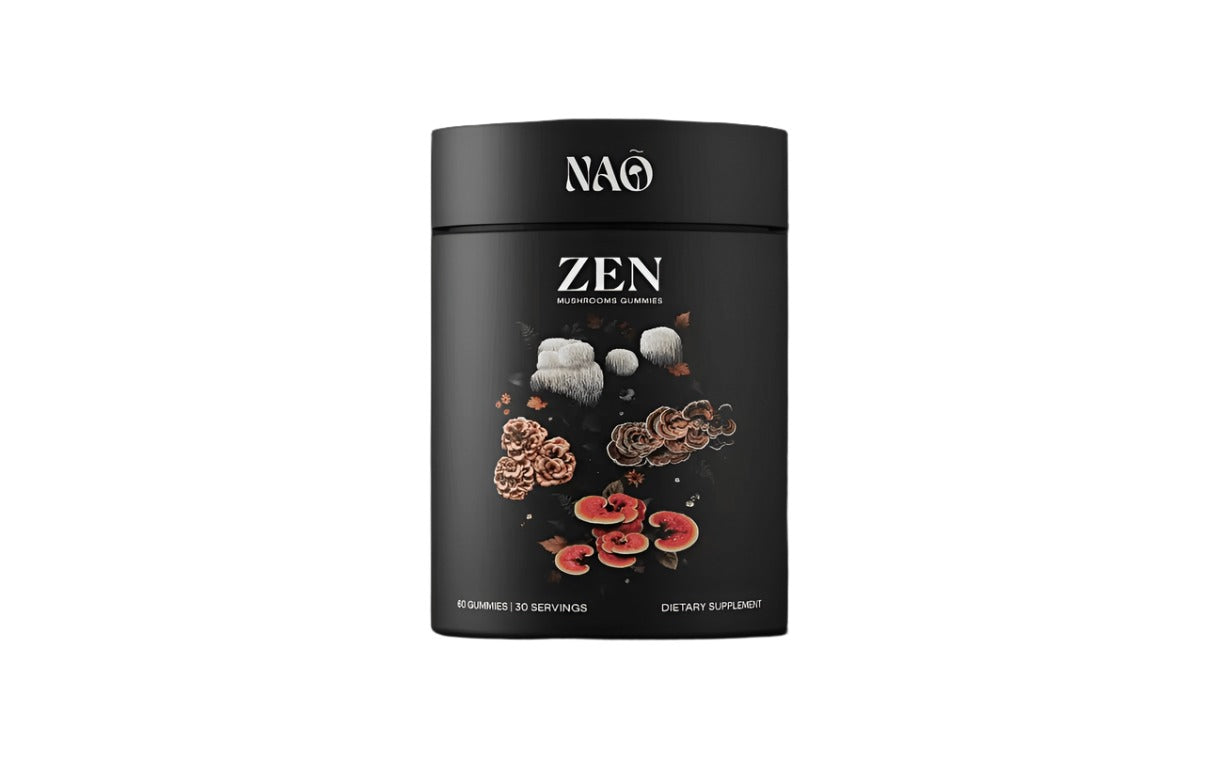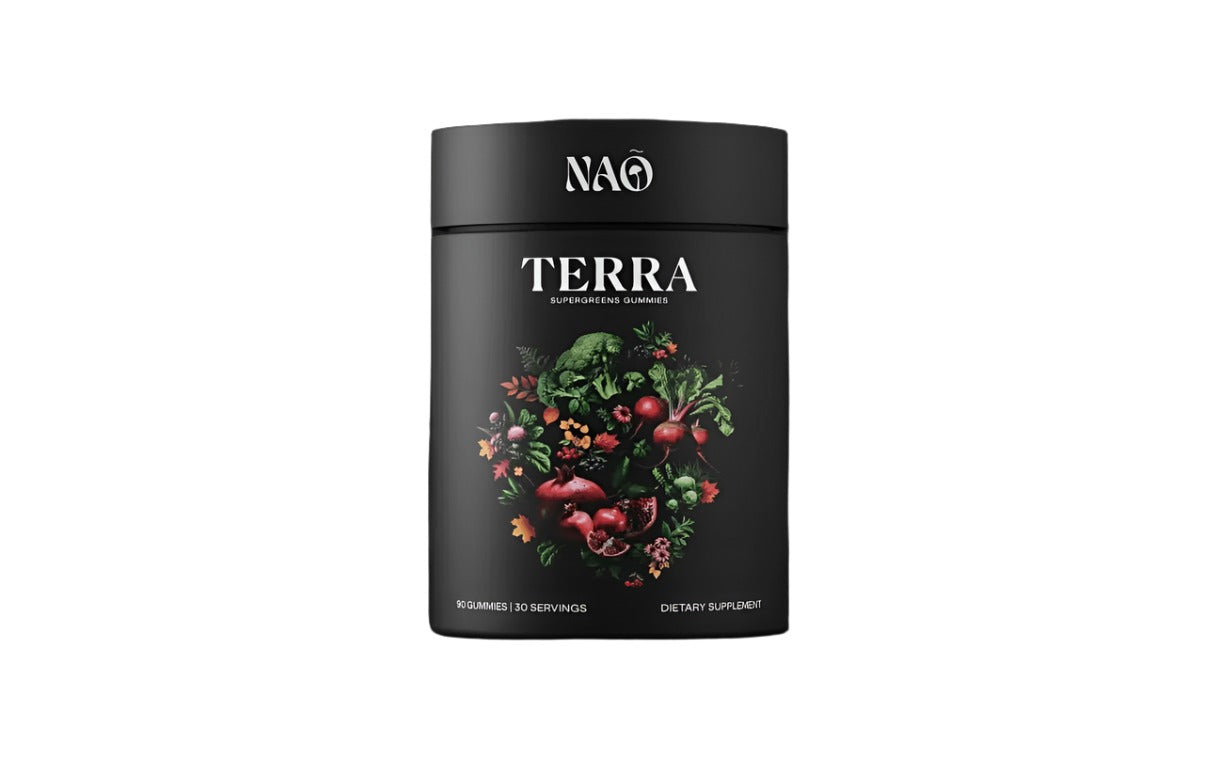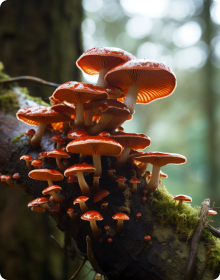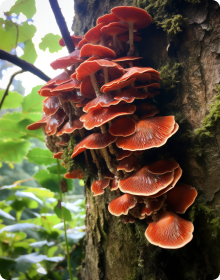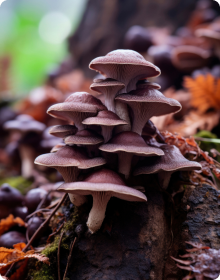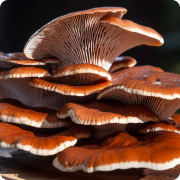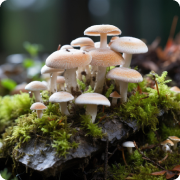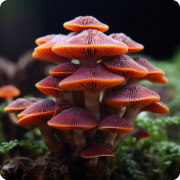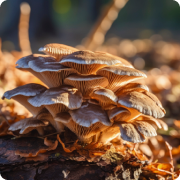Unlocking Cognitive Potential: The Fascinating World of Nootropic Mushrooms
In continuously-running chasement for cognitive enhancement, nature has consistently provided humanity with intriguing solutions. Among the latest contenders in this field are nootropic mushrooms – a fascinating array of fungi supposed to possess the power to elevate cognitive function and promote brain health. Let's explore the unique world of Nootropic mushrooms together in this article!
General Overview of Nootropic Mushrooms
Nootropic mushrooms belong to a class of natural substances renowned for their potential to enhance cognitive abilities. Derived from the Greek words "nous" (mind) and "tropos" (turn), nootropics are substances that support cognitive function without causing significant side effects. In the case of mushrooms, several varieties have captured the attention of researchers and enthusiasts alike for their purported ability to boost memory, concentration, and overall mental clarity.
Brief History and Evolution of Nootropics
The fascination with cognitive enhancement is not a modern phenomenon; it has roots deeply embedded in history. As we trace the evolution of nootropics, we find ourselves traversing ancient civilizations where natural substances were revered for their ability to sharpen the mind. Traditional medicine systems such as Ayurveda and Traditional Chinese Medicine (TCM) recognized the potential of herbs, roots, and mushrooms to enhance cognitive function and promote overall well-being.
In more recent times, the term "nootropic" was coined by Dr. Corneliu E. Giurgea in the 1970s. This marked the formal recognition of the cognitive-enhancing potential of certain compounds and laid the foundation for the modern exploration of nootropics.
What Defines a Nootropic
To be deemed a nootropic, a substance must meet specific criteria outlined by Dr. Corneliu E. Giurgea, who was mentioned earlier, the father of nootropics. A true nootropic should enhance memory and learning ability, improve brain function under disruptive conditions, protect the brain from chemical and physical assaults, and possess a low risk of side effects. Essentially, these compounds are designed to augment cognitive abilities without inducing sedation or stimulation, offering a balanced and sustainable approach to mental acuity.
Common Characteristics of Nootropic Mushrooms
Nootropic mushrooms, as a subset of these cognitive-enhancing substances, share common characteristics that make them stand out in the realm of natural brain boosters. Among these shared traits is their richness in bioactive compounds. Mushrooms like Lion's Mane, Reishi, and Cordyceps are known to contain polysaccharides, terpenoids, and other unique compounds that contribute to their potential cognitive benefits.
Another key characteristic is their adaptogenic nature. Nootropic mushrooms, by their adaptogenic properties, assist the body in adapting to stressors, be they physical or psychological. This ability not only aids in stress reduction but also contributes to overall mental resilience.
Furthermore, many nootropic mushrooms exhibit neuroprotective qualities. They are believed to shield the brain from oxidative stress and inflammation, fostering an environment conducive to optimal cognitive function. This aligns with the nootropic principle of protecting the brain from chemical and physical assaults, ensuring long-term brain health.
Nootropic Mushroom Category Variety
The landscape of nootropic mushrooms is diverse, with each variety offering a unique set of potential cognitive benefits. There are several famous representatives of this category:
- Lion's Mane (Hericium erinaceus): Recognized for its potential to stimulate nerve growth factor (NGF), Lion's Mane is linked to improved neurogenesis, which is essential for learning and memory. It is often regarded as a top choice for those seeking cognitive enhancement.
- Reishi (Ganoderma lucidum): Known as the "mushroom of immortality" in traditional Chinese medicine, Reishi is valued for its adaptogenic properties. It may contribute to stress reduction, enhance mood, and support overall well-being.
- Cordyceps (Cordyceps sinensis): Recognized for its energizing effects, Cordyceps has been traditionally used to combat fatigue and increase endurance. Its adaptogenic nature extends beyond stress resilience, encompassing physical performance.
Nootropic Compounds in Mushrooms
So, let's try to find out which components of these mushrooms make them so useful for cognitive functions.
- Beta-Glucans: Beta-glucans are polysaccharides found abundantly in the cell walls of mushrooms. They play a pivotal role in modulating the immune system and are crucial for the potential cognitive benefits of certain nootropic mushrooms. Beta-glucans have been associated with immune system support, indirectly influencing brain health. A robust immune system is essential for maintaining a healthy brain environment, and beta-glucans contribute to this equilibrium.
- Hericenones and Erinacines (Lion's Mane): Lion's Mane mushroom is renowned for containing hericenones and erinacines, compounds with the ability to stimulate the production of Nerve Growth Factor (NGF). NGF is crucial for neurogenesis – the formation of new neurons. By promoting neurogenesis, hericenones and erinacines in Lion's Mane may contribute to improved cognitive function, memory, and overall brain health.
- Triterpenoids (Reishi): Reishi mushrooms are rich in triterpenoids, which contribute to their adaptogenic qualities. Adaptogens help the body adapt to stressors, promoting a balanced response to both physical and mental challenges. Triterpenoids in Reishi play a role in stress reduction, potentially enhancing mood and contributing to an overall sense of well-being.
- Other Neuroactive Compounds: Cordyceps mushrooms contain cordycepin, a compound with potential neuroprotective effects. Cordycepin has been studied for its interaction with adenosine receptors, influencing neurotransmitter activity in the brain. Many nootropic mushrooms, including Reishi and Cordyceps, contain antioxidants and anti-inflammatory compounds. These elements help combat oxidative stress and inflammation, which are linked to cognitive decline.
Understanding the interplay of these key nootropic compounds in mushrooms provides insight into their potential cognitive benefits. Unraveling the complex chemistry within nootropic mushrooms, we gain more answers that may hold the key to unlocking cognitive potential.
Cognitive Benefits of Nootropic Mushrooms
Because of the wide variety, each of the nootropic mushrooms brings something unique to cognitive functioning.
Memory Enhancement
Lion's Mane mushroom, enriched with hericenones and erinacines, has been associated with memory enhancement. By promoting the production of Nerve Growth Factor (NGF), it may support neurogenesis, creating an environment conducive to improved memory retention and recall.
Mushrooms rich in beta-glucans, such as Reishi and Cordyceps, contribute to cognitive resilience. A healthy immune system, supported by beta-glucans, indirectly influences brain health, potentially aiding in memory function.
Focus and Concentration
Cordyceps mushrooms, known for their energizing effects, can contribute to improved focus and concentration. By combating fatigue and enhancing physical performance, Cordyceps supports sustained mental clarity, making it an ally for tasks that demand heightened attention.
The adaptogenic triterpenoids in Reishi contribute to stress reduction, helping to maintain focus under pressure. By modulating the body's response to stress, Reishi may support mental resilience and concentration.
Mood Regulation
Reishi's triterpenoids play a key role in stress reduction, influencing mood regulation. By acting as adaptogens, these compounds help the body adapt to stressors, potentially contributing to a sense of calm and emotional well-being.
Various neuroactive compounds found in nootropic mushrooms, including Reishi and Cordyceps, may have a positive impact on mood. Antioxidants and anti-inflammatory properties contribute to a neurologically balanced environment, potentially influencing mood regulation.
Neuroprotective Effects
Nootropic mushrooms are rich in antioxidants and anti-inflammatory compounds, which contribute to their neuroprotective effects. By neutralizing oxidative stress and reducing inflammation, these mushrooms create an environment that may protect the brain from age-related decline.
Cordycepin, found in Cordyceps, has been studied for its potential neuroprotective effects. Its interaction with adenosine receptors play a role in safeguarding neurons from damage, contributing to long-term brain health.
Nootropic mushrooms diverse nature
For now, let's dive into the details of each popular nootropic mushroom variety deeper: Lion's Mane, Reishi, Cordyceps, and Chaga.
Lion's Mane (Hericium erinaceus)
Lion's Mane is renowned for Hericenones and Erinacines compounds, which have been linked to the stimulation of Nerve Growth Factor (NGF). NGF is crucial for the growth and maintenance of neurons in the brain, contributing to improved cognitive function.
Cognitive Benefits are:
- Neurogenesis: The stimulation of NGF may promote neurogenesis, the formation of new neurons. This is associated with enhanced learning and memory capabilities.
- Memory Enhancement: Lion's Mane is often touted for its potential to improve memory retention and recall.
- Focus and Concentration: By supporting neural growth and connectivity, Lion's Mane contributes to improved focus and concentration.
Reishi (Ganoderma lucidum)
Reishi mushrooms are rich in triterpenoids, which contribute to their adaptogenic properties and potential health benefits. They also contain polysaccharides, including beta-glucans, known for their immune-modulating effects.
Cognitive Benefits:
- Stress Reduction: The adaptogenic nature of triterpenoids in Reishi may help the body adapt to stressors, potentially reducing the impact of stress on cognitive function.
- Mood Enhancement: Reishi is associated with mood regulation, promoting a sense of calm and overall well-being.
- Immunomodulation: The immune-modulating effects may indirectly support cognitive health by maintaining a balanced immune response.
Cordyceps (Cordyceps sinensis)
Cordyceps contains cordycepin, a compound with potential neuroprotective and anti-inflammatory effects. Cordycepin also interacts with adenosine receptors, influencing neurotransmitter activity.
Cognitive Benefits:
- Energy Boost: Cordyceps is known for its energizing effects, helping combat fatigue and promoting physical performance.
- Adaptogenic Qualities: By supporting the body's response to stress, Cordyceps contribute to mental resilience and improved cognitive function.
- Neuroprotection: Cordycepin's potential neuroprotective effects could play a role in safeguarding neurons from damage.
Chaga (Inonotus obliquus)
Chaga is rich in melanin, which contributes to its antioxidant properties. Chaga also contains various polyphenols and triterpenes, contributing to its potential health benefits.
Cognitive Benefits:
- Antioxidant Protection: The antioxidants in Chaga may help combat oxidative stress, preserving brain cells and supporting cognitive health.
- Anti-Inflammatory Effects: Chaga's anti-inflammatory properties could contribute to a neurologically balanced environment, potentially benefiting cognitive function.
- Immune Support: Beta-glucans in Chaga may modulate the immune system, indirectly influencing brain health.
Ways of Consumption
Nootropic mushrooms can be consumed in various forms, and the choice of method often depends on personal preference, availability, and the desired effects. Here are common methods of consumption and usage for nootropic mushrooms:
- Dried Mushrooms: Dried mushrooms can be rehydrated by soaking them in water before use. Once rehydrated, they can be incorporated into various dishes, such as soups, stews, or teas.
- Powdered Extracts: Mushrooms can be dried and processed into a fine powder. The powder can be added to beverages like coffee, tea, smoothies, or even sprinkled onto food. This form is convenient for precise dosing.
- Capsules and Pills: Mushroom extracts could be encapsulated or compressed into pill form. Capsules or pills offer a convenient and taste-free option for those who prefer a standardized dosage. They are taken with water as a dietary supplement.
- Tinctures: In this case, mushrooms are extracted into alcohol or another solvent. Tinctures are typically taken by placing a few drops under the tongue for sublingual absorption or added to beverages for consumption.
- Teas and Infusions: Dried or powdered mushrooms can also be steeped in hot water to create a mushroom-infused tea. Mushroom teas can be a pleasant way to consume nootropic mushrooms and are often sipped for their potential cognitive and health benefits.
- Cooked Dishes: Mushrooms, either fresh or rehydrated from dried form, can be cooked into various dishes. Incorporate them into meals like stir-fries, omelets, or pasta dishes for a flavorful and nutritious boost.
- Nootropic Mushroom Blends: Various mushroom varieties may be combined into blends or formulations. These blends are available in different forms, such as capsules, powders, or tinctures, providing a combination of nootropic benefits.
- DIY Extracts: Homemade extracts can be created by steeping dried mushrooms in alcohol or other solvents. DIY extracts offer flexibility in dosage and can be added to beverages or taken sublingually.
Scientific research on Nootropic mushrooms
Recent Advances in Nootropic Mushroom Research were dedicated to different sorts of this mushroom`s category. Despite, they were previously described, let's tell from the scientific and clinical research perspective about them.
- Lion's Mane (Hericium erinaceus): Studies have focused on Lion's Mane's ability to stimulate nerve growth factor (NGF), which plays a role in neurogenesis. Neurogenesis is the process of forming new neurons, and this has implications for learning and memory.
- Reishi (Ganoderma lucidum): Research has explored the adaptogenic and antioxidant properties of Reishi mushrooms. These properties may contribute to stress reduction and protection against oxidative stress, potentially benefiting cognitive function.
- Cordyceps (Cordyceps sinensis): Some studies have focused on Cordyceps' potential to enhance energy levels and physical performance. While traditionally used for its adaptogenic properties, research has explored its impact on fatigue and endurance.
- Chaga (Inonotus obliquus): Research on Chaga has highlighted its antioxidant and anti-inflammatory effects. These properties may contribute to neuroprotection and overall brain health.
Clinical trials and their implications for cognitive enhancement are next:
- Lion's Mane and Cognitive Function: Clinical trials have investigated the effects of Lion's Mane on memory and concentration. Some studies suggest potential benefits, but still more research is needed for final conclusions.
- Reishi and Stress Reduction: Clinical trials exploring the impact of Reishi on stress reduction and mood have shown promising results. The adaptogenic properties of Reishi may play a role in promoting emotional well-being.
- Cordyceps and Physical Performance: Clinical trials examining the effects of Cordyceps on fatigue and endurance have reported positive outcomes. These findings support its traditional use for enhancing physical performance.
- Chaga and Antioxidant Effects: Clinical studies have investigated Chaga's antioxidant effects and its potential role in reducing oxidative stress. These findings have implications for neuroprotection and cognitive health.
Future research is likely to delve deeper into the molecular and cellular mechanisms through which nootropic mushrooms exert their effects on cognitive function.
Nootropic Mushrooms and Brain Health
Nootropic mushrooms can be useful not only for cognitive functions, but also overall brain health.
Impact on Neuroplasticity
Neuroplasticity refers to the brain's ability to reorganize itself by forming new neural connections throughout life. It plays a crucial role in learning, memory, and recovery from brain injuries.
Lion's Mane is often associated with the stimulation of Nerve Growth Factor (NGF), which has implications for neuroplasticity. By promoting the growth and maintenance of neurons, Lion's Mane may contribute to the brain's ability to adapt and form new connections.
Neurogenesis and Nerve Growth Factors
Neurogenesis is the process by which new neurons are formed in the brain. Nerve Growth Factors (NGFs) are proteins crucial for the growth, maintenance, and survival of neurons.
NGF of Lion's Mane also promotes neurogenesis, potentially leading to the formation of new neurons. This process is vital for cognitive functions such as learning and memory.
Potential in Alzheimer's and Dementia Prevention
These are neurodegenerative conditions characterized by cognitive decline, memory loss, and impaired daily functioning.
Many nootropic mushrooms, including Reishi, Chaga, and Cordyceps, contain compounds with antioxidant and anti-inflammatory properties. Chronic inflammation and oxidative stress are implicated in neurodegenerative diseases. These mushrooms may contribute to neuroprotection by mitigating these factors.
Some studies suggest that Lion's Mane may have potential in addressing cognitive decline associated with conditions like Alzheimer's disease. The stimulation of NGF and the promotion of neurogenesis are mechanisms that researchers explore for their implications in dementia prevention.Nootropic mushrooms, particularly Lion's Mane, show promise in supporting brain health through mechanisms like neuroplasticity, neurogenesis, and potential prevention of neurodegenerative conditions. However, more research is needed to fully understand their role and to establish guidelines for their use in promoting long-term cognitive health.
Precautions and Potential Side Effects of Nootropic Mushrooms
Despite their potential benefits, before consuming Nootropic mushrooms, you should attentionally read about potential risks, related to them,
Allergic Reactions
Some individuals may be allergic to certain mushrooms. Cross-reactivity with other allergens is also possible. Individuals allergic to mold or other fungi might be at an increased risk of allergic reactions to nootropic mushrooms.
Interaction with Medications
Nootropic mushrooms, especially Reishi, may have mild blood-thinning properties. Individuals taking blood-thinning medications (anticoagulants) should exercise caution and consult with a healthcare professional.
People on immunosuppressive medications should also consult their healthcare provider before using nootropic mushrooms, as these mushrooms may influence the immune system.
Safe Dosage Guide
Responses to nootropic mushrooms can vary among individuals. In general, it's advisable to start with lower doses and monitor for any adverse effects.
Some users choose to cycle their usage, taking breaks between periods of consistent use. This helps prevent potential tolerance buildup and allows the body to readjust.
Nootropic Mushroom Blends and Combinations
Each mushroom variety often has its specific cognitive benefits. Lion's Mane may enhance memory, Reishi may reduce stress, and Cordyceps may boost energy. By combining these mushrooms, you can achieve a more comprehensive and balanced approach to cognitive enhancement.
Premade Nootropic Blends can offer several benefits:- Pre-made nootropic blends streamline the consumption process by offering a convenient combination of different mushrooms in controlled proportions. This ensures consistency in dosage, making it easier to incorporate them into daily routines.
- Formulators of pre-made blends often design their products with specific goals in mind, such as enhanced focus, memory support, or stress reduction. Consumers can choose blends tailored to their individual cognitive needs without having to source and combine multiple mushrooms themselves.
- Pre-made blends often incorporate a variety of nootropic mushrooms, creating a comprehensive formula that addresses various aspects of cognitive function. This approach acknowledges the potential synergies between different mushrooms, offering a more holistic cognitive support system.
- Reputable manufacturers of pre-made blends often adhere to strict quality control standards. This ensures that the mushrooms used are of high quality, free from contaminants, and processed in a way that preserves their beneficial compounds.
From Lion's Mane's dance with neurogenesis, Reishi's soothing notes of adaptogenic calm, Cordyceps' energetic crescendo, to Chaga's antioxidant serenade, Nootropic mushrooms paint a vivid picture of nature's wisdom harnessed for the betterment of our cognitive realms. The potential impact on memory, focus, mood regulation, and neuroprotection is both compelling and tantalizing.
In the words of William James, "The greatest discovery of my generation is that human beings can alter their lives by altering their attitudes of mind." Embrace the potential within these fungi, tread mindfully, consult with wisdom, and embark on a journey where these nature`s elixirs become a part of your cognitive enhancement.
